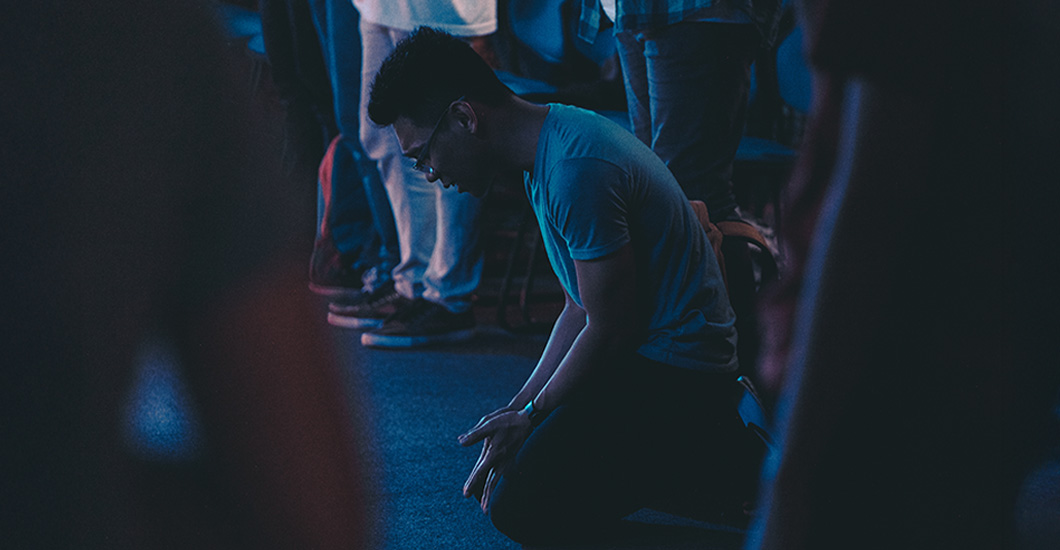Trending Articles
Five Steps to Peace
Step 1: Trust Completely in God’s Providence
A couple of years ago, I found myself in John F. Kennedy Airport in New York City, exhausted from a long international flight and completely famished. The food options were very limited by my gate, so I ended up going to a place that I otherwise would have avoided: an overpriced grill with blaring country music. I did not have that much money to spare, but since I had no choice, I ordered an overpriced burger and overpriced fries and dug in. I was happy to relieve my hunger although a little worried about my wallet.
A surprise came when it was time to pay. I was informed that a couple had seen my clerical collar and covered my bill before they left the restaurant! Very happily surprised and grateful for the stranger’s’ generosity, I sat back to enjoy the rest of the meal. At that very moment, a song by Carrie Underwood came on the restaurant’s sound system: “Jesus Take the Wheel.” It occurred to me that when you actually do let Jesus take the wheel, He takes care of everything, even your wallet!
The first of the five steps to being at peace is trusting completely in God and just letting Him “take the wheel.” This step is really the most crucial: once we abandon ourselves completely to God’s loving Providence, everything else simply falls into place. It really is amazing how He provides when we let Him: He loves us so much that He not only takes care of our needs but will often give us extra gifts just to make us happy. All we have to do is try our best to truly live what our Lord exhorts in the Gospel:
“Look at the birds in the sky; they do not sow or reap, they gather nothing into barns, yet your heavenly Father feeds them. Are not you more important than they? Can any of you by worrying add a single moment to your lifespan? Do not worry about tomorrow; tomorrow will take care of itself” (Matthew 6:26-27).
Step 2: Keep Your Eyes on Heaven
A few years ago, I got it into my head that I wanted to run a marathon. I trained and trained for five months straight—long runs on the weekends and short runs during the week. When the big day came I was bursting with energy and practically biting at the bit to take on the 26.2-mile challenge.
I went to the starting line with the goal of sticking to a pace of nine minutes per mile, but I felt so great that I started out much faster. I was knocking out amazing eight-minute miles and everything seemed fine…until mile 18 when I hit the wall….hard. My legs cramped, my vision blurred, and my head felt woozy. Eight-minute miles became 9 minutes and then 10M minutes and finally 11 minutes. I was hurting so badly that the only thing that kept me going was thinking about the finish line. When I finally hobbled across and received my medal and a cold Gatorade, I was completely depleted, but I felt like I was in Heaven.
Life is like a marathon and Heaven is the finish line. Life is tough and we will doubtlessly hit the wall numerous times during the course of our earthly existence, but if we keep our eyes on the goal, one day we will be able to say with Saint Paul, “I have fought the good fight, I have finished the race, I have kept the faith” (2 Timothy 4:7).
To keep our eyes on Heaven, we need to constantly remind ourselves that we are pilgrims on a journey, and we have to keep in mind that the goodness of our life on Earth is just a preview of what is to come. Maintaining this focus on Heaven requires taking time to pray and contemplate the things above. Life will always weigh us down, but if we keep our eyes on our goal, we will always find the strength to keep moving forward.
Step 3: Make the Best of Your Circumstances
About seven miles off the western coast of Ireland, a lonely island looms out of the sea, the tip of a massive oceanic mountain. Fifty-four acres and 715 feet high, Skellig Michael is now home only to a colony of Northern Gannets, but there was a time when this remote outcropping hosted more than seabirds. For more than 600 years, it was home to Irish monks seeking complete solitude and spiritual freedom.
The monks of Skellig Michael limited their own material freedom so severely because the harsh discipline helped them build the virtues needed to be free from all that could lead them away from God. Although they were physically confined to 54 acres, they were spiritually soaring, because they had put the North Atlantic between themselves and anything that could distract them from God. Their material limitation was the condition for their spiritual success.
Although very few of us are called to such radical measures, all of us find ourselves in limiting circumstances; we all find ourselves on our own “skelligs.” Part of Christian life is accepting the hardships and difficulties of our lives as a necessary condition for achieving closeness to God:
“If anyone wishes to come after Me, he must deny himself, and take up his cross daily and follow Me” (Luke 9:23).
The key to finding peace is learning to love the “skellig” on which God has placed you and allowing yourself to flourish there. Some skelligs are tougher than others, but one thing you can be sure of is that the one on which you find yourself is perfect for you. God knows what you can handle, and He knows exactly what you need to grow in spiritual freedom.
Peace comes when we choose to take advantage of the good things at our disposal rather than longing for what is not. We find peace when we choose not to bang our heads against the wall about things that will never change and choose to focus on how we can flourish rather than fixating on the ever-abundant deficiencies of our circumstances.
Step 4: Live Fully in the Present
We all know that feeling of melancholy that creeps in every time something good is about to come to an end, be it the last day of vacation, the close of the holiday season, or the final hours of Sunday evening. The feeling may be lessened when more enjoyable things are soon to come, but there will always be those moments when you realize that the good times will not roll forever.
Even though we will always have to face this unpleasant reality, the good news is that it does not have to be so miserable when we do. The key is to stop worrying about the future and learn to live the present to the full. God has so many blessings that He wants to give us, but to receive them, we have to be where He is: in the present.
There is no limit to the blessings that God wants to give us, but we often hinder His generosity by being too distracted to receive them. God wants to give to us and does give to us; all we have to do is open our eyes of faith and accept what He has to offer. God will take care of our future problems if we simply let go and focus on living the present moment. Each day is bursting with blessings, but we have to live in the present to receive them.
Acts of trust in God’s blessings are essential to living in the present because there are always an infinity of “what-ifs” waiting to swarm our imaginations if we allow them. Most of these “what-ifs” are nothing more than energy-sapping variables that are simply beyond our control. To live in peace, we must learn to leave those variables in God’s hands and focus on the few that are within our limited spheres of influence, all of which can only be handled one at a time in the present.
Step 5: Stop Clinging
Not long ago, I had the opportunity to spend some time with friends who live near San Jose, California. When I told a go-getter businessman friend that I would be in Silicon Valley, he got very excited and insisted that I do some networking: “Those tech companies are changing the world! Be proactive and meet people there!”
Since I respect my friend a lot, I took his advice and started thinking of a way to network and connect with someone at Google. However, as I worked on solving the problem (becoming tense in the process), a quiet thought from the Holy Spirit snuck into the midst of my calculations and plans: “Let me handle this.”
My instant reaction was to “cling” to the project and work on it myself, but the thought kept coming back: “Just let go and trust in Me.” So that is what I did. I let go and I left it in God’s hands.
The next day, a friend (who knew nothing about my desire to visit Google) said to me out of the blue, “Hey, a new buddy of mine at Google just invited me for a tour. Want to come?” I could not believe it!
Why do we cause ourselves so much stress trying to do everything when all we have to do is turn to God? He has something that we lack: infinite knowledge. From all of eternity, He knows each of us thoroughly; He knows everything that can happen to us and everything that will happen.
God knows exactly what we need. Life is so much more beautiful and peaceful when we free ourselves from the ruthless and superficial standards of the world and allow ourselves to be enveloped by the unconditional love of God our Father. There is nothing more frustrating than clinging to things that are beyond our control; there is nothing more liberating than letting go and leaving everything to God.
Eric Wandrey is a seminarian of the Archdiocese of New York. He has a licentiate degree in philosophy from Regina Apostolorum Pontifical Athenaeum in Rome and is looking forward to his ordination in 2019 after finishing his theology studies. He enjoys long-distance running, art appreciation, writing, philosophizing, and spending time with friends. Wandrey is especially excited about evangelizing contemporary culture through the power of artistic beauty. To receive his spiritual reflections on great works of art and to follow his journey towards the priesthood, be sure to follow him on his blog, God-Lights (www.godlights.me).
Latest Articles
Want to be in the loop?
Get the latest updates from Tidings!








